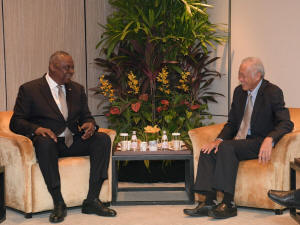Asia security summit kicks off amid US-China tensions
 Send a link to a friend
Send a link to a friend
 [June 02, 2023]
By Joe Brock [June 02, 2023]
By Joe Brock
SINGAPORE (Reuters) - Asia's top security meeting opened on Friday, with
intensifying competition between the United States and China expected to
dominate a weekend of high-level speeches, backroom military dealings
and delicate diplomacy.
The Shangri-La Dialogue, which attracts senior military officers,
diplomats, weapons makers and security analysts from around the globe,
is taking place June 2-4 in Singapore.
Australian Prime Minister Anthony Albanese will deliver the keynote
address on Friday evening, before U.S. Defence Secretary Lloyd Austin
and China's new Defence Minister Li Shangfu are expected to trade barbs
in speeches over the weekend.
The relationship between the U.S. and China is at its lowest point in
decades, as the two superpowers remain deeply divided over everything
from the sovereignty of Taiwan to cyber espionage and territorial
disputes in the South China Sea.
Hopes that the summit in Singapore could be a chance to mend ties
between Washington and Beijing were dealt a blow last week when Li
declined an offer to meet with Austin.
Li, who was named China's new defence minister in March, was sanctioned
by the U.S. in 2018 over weapons purchases from Russia.

There was a brief moment of Sino-American dialogue at the summit during
a sideline session on cybersecurity.
U.S. Director of National Intelligence Avril Haines said "we should be
talking to China" after being posed a question from Chinese Senior
Colonel Zhu Qichao about collaborating on cybersecurity risks associated
with artificial intelligence.
AUSTRALIA
Albanese's speech comes as Australia is seeking to stabilise its
relationship with China after a three-year diplomatic freeze and trade
blocks that Beijing is now easing.
[to top of second column]
|

Singapore's Minister for Defence Dr Ng
Eng Hen meets with U.S. Defense Secretary Lloyd Austin on the
sidelines of the 20th Shangri-La Dialogue in Singapore June 2, 2023.
Singapore Ministry of Defence/Handout via REUTERS

China buys the bulk of Australia's valuable iron ore and is its
biggest trading partner.
The United States is Australia's biggest security ally, and Beijing
has criticised a deal announced in March to buy U.S. nuclear-powered
submarines.
Australia is set to spend A$368 billion ($250 billion) over three
decades on the submarine programme, part of a broader security pact
with the U.S. and Britain known as AUKUS.
Australia is also part of the Five Eyes intelligence collection and
sharing network, along with the U.S., Britain, Canada and New
Zealand – a grouping that Chinese officials say is part of the
West’s lingering “cold war mentality” and an attempt to contain its
rise.
Since being elected in May 2022, the Albanese Labor government has
sought closer ties with ASEAN countries. Australia’s defence chief
has said that as great power competition in the region persists, his
country is focused on deterring conflict and deepening engagement
with partners, including Pacific island and South East Asian
nations.
($1 = 1.4743 Australian dollars)
(Reporting by Joe Brock, Greg Torode, Kanupriya Kapoor, Xinghui Kok,
Chen Lin and Raju Gopalakrishnan; Additional reporting by Kirsty
Needham; Editing by Gerry Doyle)
[© 2023 Thomson Reuters. All rights
reserved.]This material may not be published,
broadcast, rewritten or redistributed.
Thompson Reuters is solely responsible for this content.
 |